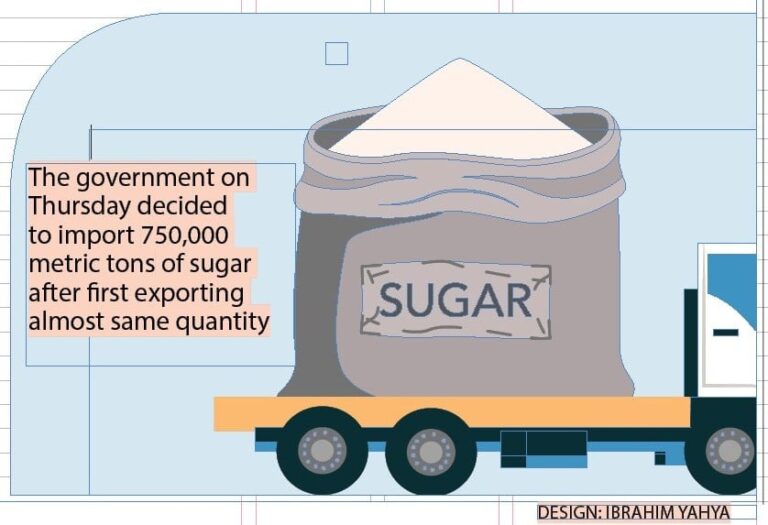ISLAMABAD:
In a paradoxical move, the government on Thursday decided to import 750,000 metric tonnes of sugar after having already exported nearly the same quantity during the current fiscal year — a move that has driven domestic prices sharply higher, benefitting sugar millers.
The move has raised questions over the rationale behind the government’s earlier approval of sugar exports, which critics warned would hurt domestic supply and inflate prices.
The new plan includes submitting a policy for the import of 250,000 metric tonnes of raw sugar to the cabinet for approval, while 500,000 metric tonnes of refined sugar have already received in-principle approval, Deputy Prime Minister Ishaq Dar announced via X (formerly Twitter) after chairing his second meeting on the issue in three days.
According to the Pakistan Bureau of Statistics (PBS), the country exported 765,734 metric tonnes of sugar between July and May this fiscal year, earning Rs114 billion. This marks a 2,200% increase in sugar exports compared to the same period last year.
Exporting first and then deciding to import has sparked concerns over the government’s contradictory policies and the disadvantageous position imposed on consumers. After exports, domestic sugar prices hit a record Rs190 per kilogram — Rs50 higher than the pre-export price. A Ministry of National Food Security official claimed that there were sufficient stocks and imports are only being considered to lower prices.
As of the latest PBS weekly bulletin, sugar was priced between Rs170 and Rs190 per kilogram across the country.
In March, the government had fixed the retail price of sugar at Rs164 per kilogram — 13% higher than the cap set during the export approval period — allowing millers to enjoy windfall gains in both local and export markets. Dar’s committee had negotiated the ex-factory and retail prices of sugar with the Pakistan Sugar Mills Association (PSMA), which has previously been accused of cartel-like behaviour by the nation’s antitrust watchdog — the Competition Commission of Pakistan. Despite the agreed rates, the government failed to ensure stable retail prices.
Dar added on Thursday that the Ministry of National Food Security has been instructed to seek the Economic Coordination Committee’s (ECC) formal approval for the sugar imports. Currently, the deputy prime minister is making key economic decisions that are later presented to formal forums for ratification.
On Wednesday, Dar also announced a downward revision of the proposed sales tax on solar panel imports — from 18% to 10% — for the upcoming fiscal year, diverging from the initial budgetary proposal.
Finance Minister Muhammad Aurangzeb, meanwhile, is engaged in trade negotiations with the United States — normally the responsibility of the commerce ministry.
The sugar import decision followed a high-level meeting attended by the Minister for National Food Security, Special Assistant to Prime Minister (SAPM) Tariq Bajwa, officials from the Federal Board of Revenue (FBR), the Federal Investigation Agency (FIA), Ministry of Industries and Production, PSMA, and provincial representatives.
Dar reiterated the government’s commitment to balancing the interests of both consumers and producers, stressing the importance of making essential commodities affordable and widely available.
According to PSMA’s presentation at the meeting, average monthly sugar consumption last year was 533,000 metric tonnes, with a total annual consumption of 6.4 million tonnes. In the first half of this fiscal year, monthly consumption showed a negligible increase of 0.003% to 535,016 metric tonnes, totalling 3.5 million tonnes so far. PSMA claims current sugar stocks stand at 2.8 million tonnes — enough to meet demand until November 21 even at the compressed consumption level of 535,000 metric tonnes per month. However, the government’s decision to import 750,000 tonnes suggests that either the shortage is more acute than reported or consumption is higher than projected.
Experts had earlier opposed the government’s decision to export sugar, fearing that it would jeopardise supply and raise prices for the entire population to benefit a small group of industrialists. The government’s control over sugar trade also contradicts its recently adopted free-market agricultural policies.
“Export and import decisions should be left to farmers and market forces, not to selective millers with political influence,” said Usama Mela, a Pakistan Tehreek-e-Insaf (PTI) MNA, during a National Assembly Standing Committee on Finance meeting this week.
The PSMA, whose members are direct beneficiaries of the export, also recommended curbing sugar smuggling to neighbouring countries and proposed a tolling policy for importing raw sugar to manage stock shortages. PSMA also suggested starting the crushing season from November 1 — a proposal that is largely seen as symbolic and may be an attempt to deflect the criticism over the export of sugar. The PSMA stated in the meeting that without duties and taxes the cost of imported sugar was Rs153 per kilogram, which is still Rs37 per kilogram cheaper than the local price bonanza. The millers claimed that the country produced 5.9 million metric tonnes of sugar this year, which was 14% or nearly 1 million tonnes less than the previous crushing season.

